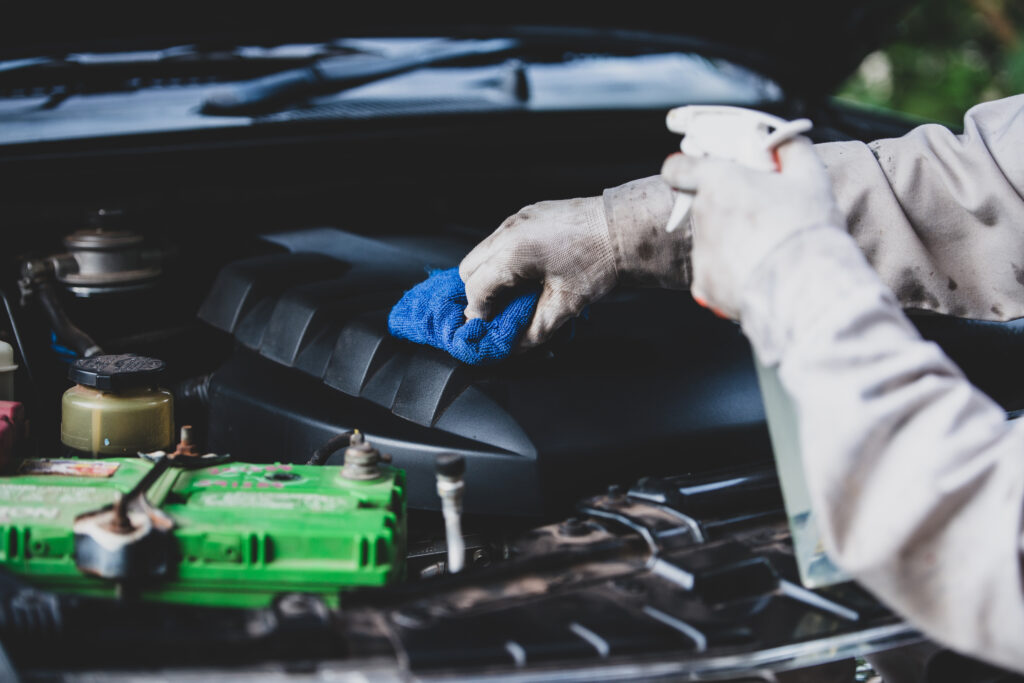
Taking care of your car’s engine is essential for keeping it running smoothly. But how do you go about making sure it looks good too?
Engine detailing is the answer! This ultimate guide will show you all the safe ways to keep your engine looking like new, so you can be confident that your car is both well-maintained and attractive.
From choosing the right cleaning supplies to learning which parts to avoid, this guide will give you all the information you need to get started with engine detailing.
With a few simple steps, you’ll be on your way to having an engine that looks as good as it runs!
Choosing The Right Supplies

When detailing an engine, the first step is to evaluate what products and materials are needed to get the job done right. Choosing the right supplies is essential for cleaning, protecting, and restoring a vehicle’s engine. It’s important that you take the time to choose the best products for your particular car model and engine type.
When deciding on products, look out for quality over quantity. There’s no need to buy a large amount of items if they don’t meet the standards of your vehicle. Choose from reliable brands that make high-quality materials designed specifically for engines.
Also, consider whether or not you need specialty tools like brushes or scrapers depending on how much buildup there is in certain areas. Once you’ve acquired all the necessary supplies, it’s time to begin preparing your engine for detailing. Proper preparation will ensure that your detailing process is thorough and successful.
Be sure to read all product instructions carefully before beginning any work on your vehicle’s engine.
Preparing The Engine

Now that you have the right supplies, it’s time to prepare the engine for details. This is an important step, as it sets you up for success.
First, start by draining any fluids from the engine. This will help reduce mess and make sure that no fluid gets into areas where it shouldn’t be during the detailing process.
After all fluids have been removed, use a pressure washer to thoroughly clean the engine and remove any dirt or debris. Make sure you pay attention to small crevices and hard-to-reach areas so they are completely free of dirt and grime.
Use a pressure washer to clean the engine.
Make sure to drain all fluids before beginning.
Pay attention to small crevices while cleaning.
When finished with this step, your engine should be ready for further detail work like polishing components or applying protective coatings. It is essential to take your time during this preparation phase – rushing can lead to missed dirt and debris which could hinder later steps in the detailing process. With proper preparation, you can get your engine looking like new in no time!
Cleaning The Engine
Cleaning your engine is essential to keeping it looking like new and protecting it from dust and dirt buildup. It’s not as difficult as you may think – with the right cleaning supplies and a bit of elbow grease, you can have your engine looking shiny and pristine in no time!
The first step is to start by removing any excess dirt or grime that might be on the surface. You can do this by using a soft-bristled brush or even an old toothbrush to gently scrub away any caked-on dirt or oil. Be sure to take extra care around sensitive parts such as wires and hoses.
Once you’ve removed all of the visible dirt, use a damp cloth to wipe down the surface of the engine in order to remove any remaining debris.
After wiping down your engine, use a mild detergent such as car wash soap or dish soap diluted with water to thoroughly clean the engine bay. Take extra care when scrubbing around electrical components, air filter housings, and other sensitive parts of your vehicle’s engine.
Once finished, rinse off all of the suds with plenty of clean water before drying completely with a clean microfiber cloth.
With a freshly cleaned engine, you’re now ready to move onto polishing it for a brilliant shine!
Polishing The Engine
Polishing your engine is an important part of keeping it looking like new.
There are a few different polishing techniques that you can use to make sure your engine is shining bright.
First, you’ll need to select the right polish for the job.
If you’re dealing with tough stains, you’ll want to opt for a stronger polish.
If not, a milder polish should be sufficient.
Once you’ve selected the right polish, it’s time to start buffing your engine.
To do this, you’ll need an electric buffer or a polishing cloth and some elbow grease!
Start by applying the polish in small circular motions and continue until the entire surface has been polished.
Be sure to pay attention to any hard-to-reach areas as well so you don’t miss anything.
After that’s done, give your engine one more look over and admire your work!
Now that it’s sparkling clean and shining brightly, it’s time to protect its luster with some proper care and maintenance.
Protecting The Engine

Protecting the engine is essential in keeping it up and running and looking like new. One of the most important ways to do this is to properly protect the components from wear and damage. This can be done by applying a protective coating that will help prevent corrosion, rust, and other forms of damage from occurring. The coating should also be applied on an annual basis to ensure that all areas are adequately covered.
Another way of protecting the engine is through regular maintenance checks. Routine inspections should be carried out to check for any signs of wear or damage, as well as to ensure that all components are working correctly.
Additionally, changing the oil regularly can help keep the engine running smoothly and can help reduce wear on parts over time.
Finally, taking care to avoid spilling any liquids or debris onto the engine can help protect it from further damage or contamination. It is also important to clean up any spills immediately in order to minimize any potential damage caused by them.
Taking these simple steps will help keep the engine looking like new for years to come.
Frequently Asked Questions
How Often Should An Engine Be Detailed?
When it comes to engine detailing, the proper frequency depends on how much use the vehicle gets and how well you take care of it.
It’s a good idea to detail your engine at least once a year if you’re taking a DIY approach.
If your car is driven often, you may want to consider cleaning it every 6 months or so.
As long as you follow safe techniques, you can keep your engine looking like new.
How Much Does It Cost To Detail An Engine?
Detailing an engine can range in DIY cost depending on the type of engine you have.
For a small engine, such as a motorcycle or lawnmower, it might cost around $50 in supplies to detail your engine.
On the other hand, if you have a large automobile engine, it could easily cost double that amount – or more – to get the job done right.
Are There Any Special Tools Needed For Engine Detailing?
When it comes to engine detailing, proper preparation is key.
Depending on the type of cleaning solutions you choose to use, you may need a few special tools.
These could include things like degreasers, polishers, brushes, and rags.
Make sure to always wear protective gloves when using any kind of cleaner or chemical on your engine.
With the right tools and techniques, you can keep your engine looking like new for years to come!
Is Engine Detailing Necessary For All Types Of Vehicles?
Engine detailing isn’t necessary for all vehicles, but there are some benefits to doing so. Depending on the type of vehicle you have, it may be worth considering engine detailing as a way to keep your engine in top condition.
Although there are benefits such as improved performance and better curb appeal, there are also drawbacks which include the cost involved and potential damage if not done properly.
Ultimately, it’s up to you to decide whether or not engine detailing is right for your vehicle.
How Long Does It Take To Detail An Engine?
Engine detailing can take anywhere from an hour to several hours depending on the type of vehicle and its condition.
Preparation is key, as it’s important to ensure the engine temperature is not too high or too low before beginning.
It’s also essential to use suitable cleaning techniques, such as using a soft brush for hard-to-reach areas.
Ultimately, engine detailing is a time consuming process requiring patience and attention to detail in order to achieve the desired results.
Conclusion
To sum up, engine detailing can be a great way to keep your vehicle looking like new. It’s important to do it on a regular basis and it doesn’t have to cost a lot of money. You don’t need any special tools and it’s applicable to all types of vehicles.
Depending on the size of the engine, it shouldn’t take more than an hour or two to complete the job. I highly recommend investing in engine detailing if you want to keep your car in great shape for years to come. It’s really worth the effort!



